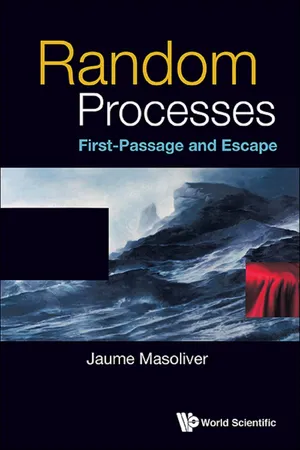
- 388 pages
- English
- ePUB (mobile friendly)
- Available on iOS & Android
About this book
-->
Random processes are one of the most powerful tools in the study and understanding of countless phenomena in natural and social sciences.
The book is a complete medium-level introduction to the subject. The book is written in a clear and pedagogical manner but with enough rigor and scope that can appeal to both students and researchers.
This book is addressed to advanced students and professional researchers in many branches of science where level crossings and extremes appear but with some particular emphasis on some applications in socio-economic systems.
--> Contents:
- Random Processes:
- Fundamentals of Probability
- Random Processes: Definitions and General Properties
- Markov Processes
- Diffusion Processes
- Fokker–Planck Equations in Several Dimensions
- Linear Response Theory
- Stochastic Calculus with Some Applications:
- Introduction to Stochastic Calculus
- Stochastic Differential Equations
- Some Financial Applications
- The Level Crossing Problem:
- First-Passage, Escape and Extremes. General Settings
- The Level Crossing Problem for Diffusion Processes
- First-Passage and Extremes in Socio-Economic Systems
-->
--> Readership: Advanced students and professional researchers. -->
Random Processes;First-Passage Times;Stochastic Calculus;Extremes0 Key Features:
- The book gathers some aspects that are often disseminated in several publications (books and technical reports)
- The treatment of topics is rather unique (specially those of first-passages)
Tools to learn more effectively

Saving Books

Keyword Search

Annotating Text

Listen to it instead
Information
PART 1
Random processes
Chapter 1
Fundamentals of probability
1.1 Spaces of probability


Table of contents
- Cover Page
- Title Page
- Copyright
- Dedication
- Preface
- Contents
- Random processes
- Stochastic calculus with some applications
- The level crossing problem
- Bibliography
- Index
Frequently asked questions
- Essential is ideal for learners and professionals who enjoy exploring a wide range of subjects. Access the Essential Library with 800,000+ trusted titles and best-sellers across business, personal growth, and the humanities. Includes unlimited reading time and Standard Read Aloud voice.
- Complete: Perfect for advanced learners and researchers needing full, unrestricted access. Unlock 1.4M+ books across hundreds of subjects, including academic and specialized titles. The Complete Plan also includes advanced features like Premium Read Aloud and Research Assistant.
Please note we cannot support devices running on iOS 13 and Android 7 or earlier. Learn more about using the app